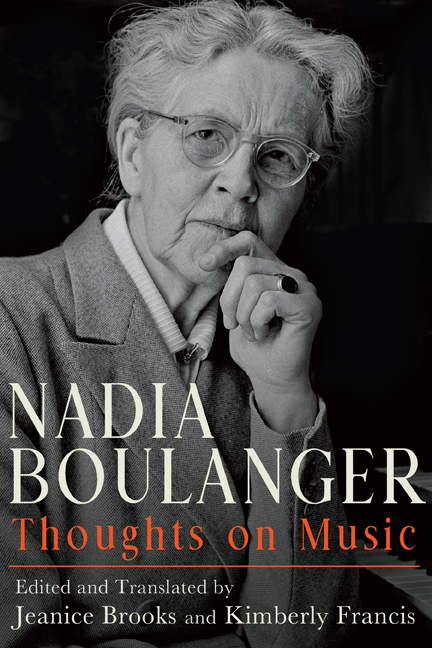Book contents
- Frontmatter
- Contents
- List of Illustrations
- Acknowledgments
- Editorial Apparatus and Critical Notes
- Note on Translations
- List of Abbreviations
- Timeline of Nadia Boulanger’s Life
- Introduction
- Part One Journalism, Criticism, Tributes
- Part Two Lectures, Classes, Broadcasts
- Bibliography of Nadia Boulanger’s Published Writing
- General Bibliography
- Index
“La symphonie d’Igor Strawinsky,” Spectateur 2, no. 78 (November 26, 1946): 6 (complete text)
Published online by Cambridge University Press: 15 October 2020
- Frontmatter
- Contents
- List of Illustrations
- Acknowledgments
- Editorial Apparatus and Critical Notes
- Note on Translations
- List of Abbreviations
- Timeline of Nadia Boulanger’s Life
- Introduction
- Part One Journalism, Criticism, Tributes
- Part Two Lectures, Classes, Broadcasts
- Bibliography of Nadia Boulanger’s Published Writing
- General Bibliography
- Index
Summary
Concerts Reviewed
(asterisk indicates premiere)
November 21, 1946 (Théâtre des Champs-Elysées, Orchestre national)
El sombrero de trespicos, 2 suites, Manuel de Falla
Sonata for Four Horns, Carlos Chavez
La Douce France, Jean Françaix
Symphony in Three Movements, Igor Stravinsky* (Frenchpremiere)
We will never forget this evening of November 17, 1946. We come, a small group of Igor Stravinsky's friends, to hear the orchestral rehearsal for his new symphony. We believe ourselves certain that we know the work very well; its form, its language, its orchestration have long been the focus of our impassioned attention; each of its notes resonates in our memory.
And yet, what a surprise awaits us! What discoveries we will make over the course of these extraordinary hours!
Désormière is at the podium, simple, understated, precise, inflexibly confident, because he has been completely infused by every part of this complex and shining score. Without preamble, he gives the downbeat and, almost without stopping, continues until the end of the work. A stunning reading, of astonishing audacity and virtuosity.
We look at each other, astounded. How could we have believed we understood, that we had imagined what this unimaginable sonority would be? How could we have been so naïve as not to guess that these marvelous combinations would bring us something we had never heard before?
Then Désormière proceeds to polish it. With a single word, he explains to each person his role, emphasizing the precision of Stravinsky's indications. The work takes shape in front of us in all its admirable logic, invention, and balance.
We are moved beyond what is appropriate to admit. Faced with this masterpiece, we discover it to be even more beautiful than we had known, we who had already placed it on such a pedestal.
What a shame the public could not be invited to such rehearsals; they are for the ears what the detailed study of paintings is for the eyes. Approaching it by the direct, true path. A single hearing allows only an entirely fleeting impression where sensation plays a troubling role. And many good-willed listeners pass by a masterpiece without recognizing it, just because they have not truly heard it.
- Type
- Chapter
- Information
- Nadia BoulangerThoughts on Music, pp. 241 - 242Publisher: Boydell & BrewerPrint publication year: 2020



